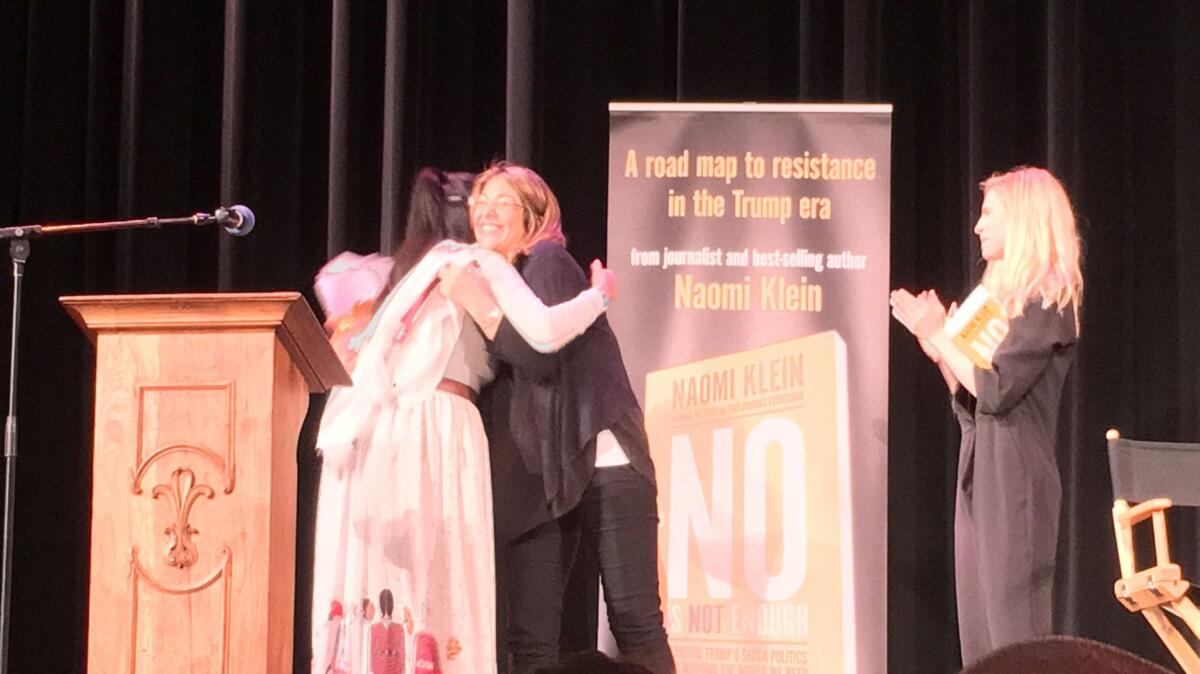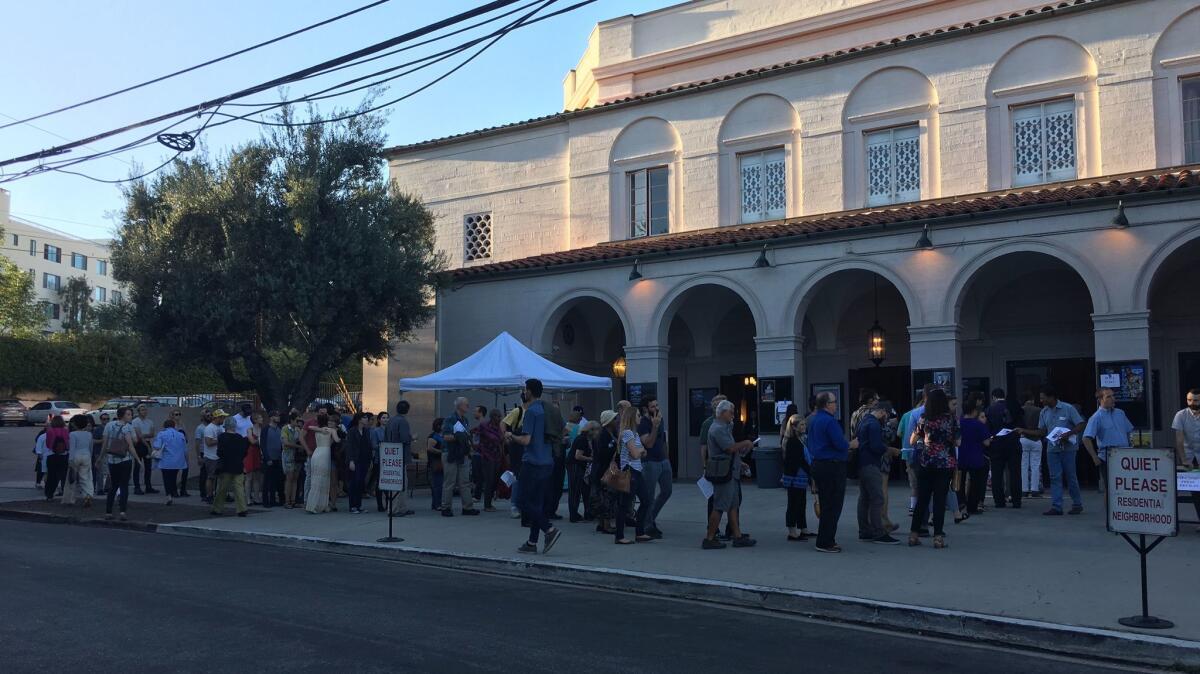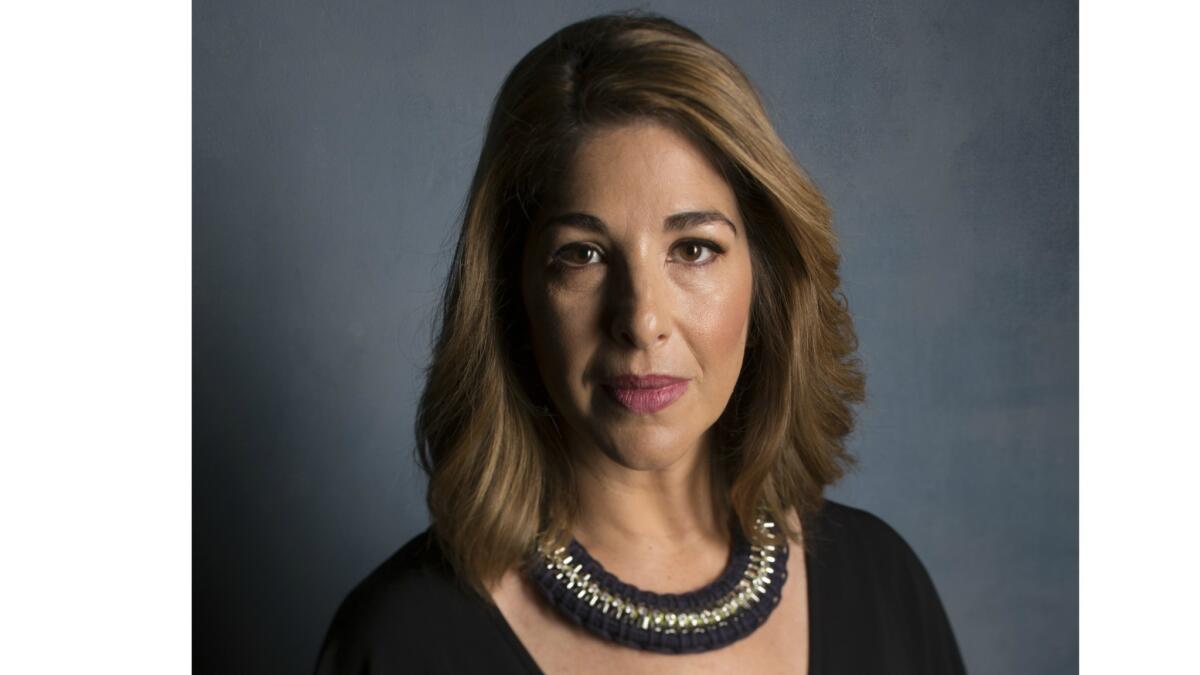Naomi Klein and Brit Marling talk Trump, branding, protest and activism

- Share via
Naomi Klein, on tour with her new book “No Is Not Enough: Resisting Trump’s Shock Politics and Winning the World We Need,” may have been preaching to the choir at a sold-out event at the Wilshire Ebell Theatre Wednesday night, but that choir felt particularly ready to receive. When curtain time ran late, a drumroll of claps started up to bring the author on stage. “I’m going to make some assumptions about this crowd,” she said, drawing laughter, when prefacing her reading. “I’m going to make the assumption that you’re ready to cut to the chase.”
Klein herself seems ready: Books are typically slow-food, but “No Is Not Enough” was written in record speed. The author, known for her progressive views and cultural criticism, has brought those powers to bear in writing about what she sees as a critical juncture in history.
“Trump is not a rupture at all,” she read from her book’s conclusion, “but rather the culmination, the logical end point, of a great many stories our culture has been telling for a very long time — that greed is good, that the market rules, that money is what matters.” She described the current political reality as “dystopian nonfiction,” outrage at that reality “the horror of recognition.”
Klein admitted to that recognition in herself.
“It has made me determined to kill my inner Trump,” she said. She also spoke about releasing “No Is Not Enough” with Haymarket, a nonprofit publisher. (Klein has previous published with Penguin, Metropolitan Books and Picador.) Although she did not make the connection explicitly, the thread between an “inner Trump” and corporate publishing was implied.

After her reading, Klein was joined on stage by the woman who narrated the audiobook, whom Klein introduced as “the world’s most overqualified audio book reader.” It was actress, screenwriter and producer Brit Marling, co-creator and star of the Netflix series “The OA.” Marling possesses a pointed stillness on stage; both her presence and her questions were composed. Sitting opposite the author in a director’s chair, she asked Klein to contextualize Trump’s politics within the schema she created in an earlier book, “No Logo,” which critiqued corporate brands.
“It wasn’t until ‘The Apprentice’ that he became a hollow brand,” Klein said, describing that reality show as “televised class war.” She defined the brand laid forth in “The Apprentice” as “impunity through wealth” and traced its ramifications. “We’re all inside Trump’s reality show now,” she said, referencing media engagement with the Comey investigation as eliciting a kind of “who’s being voted off the island” response. She encouraged the audience to focus on disrupting Trump’s other brand, MAGA (“Make America Great Again”), and uniting under a common cause while “refusing to play my crisis is bigger than your crisis.”

“There needs to be another story to counter that,” she said. “It’s about building stories that connect us.” Marling cited a passage in the book that quotes veteran Wes Clark Jr.’s apology at Standing Rock as having moved her. What made his speech so powerful? “It’s so rare,” said Klein, in a culture accustomed to “erasing parts of our history so that we can’t learn from them.”
Marling agreed. “We’re like an Etch A Sketch,” she said and returned to the idea of reframing the narrative as a crucial part of progress. A new story, Marling offered, may be that “the people will save the people.” Klein’s book tour reflects that sentiment: Representatives of activist organization the Leap and the nonprofit organizations Honor the Earth and Physicians for Social Responsibility’s Los Angeles chapter spoke before and after the main event. Even on a book tour, she is not speaking alone.
Throughout the evening, Klein drew cheers and applause of approval and recognition, especially when offering the kernel of her message: that “no” and resistance must be followed by “yes” and systemic change. It’s time to “dream and plan for a better world,” she said.
One audience member, Eric Shevrin, was glad to be reminded of the connection between Trump and the brand myth-making critiqued in “No Logo.” “I forgot how much that permeates everything,” he said, and that he was leaving with a confirmed sense that “deciding with your dollars is the only thing you can do.”
Nicki Thibeault, who had arrived with L.A.-chapter members of the leftist activist organization Refuse Fascism to hand out fliers, applauded Klein’s stance but doesn’t think it goes far enough. He and his fellow chapter-members chose to attend Klein’s appearance because they felt the cover of her book was too close to their own signage to be coincidence. “It seemed like a not so subtle dig at our organization,” he said of the similar font, an interesting confluence of the power of branding showing up at Klein’s own event.
Before time was up, Klein reversed the interview to ask Marling the evening’s final question, on behalf of a friend. Is Marling, whose work incorporates the fantastical, just a normal human being with an incredible imagination, or does she in fact spend part of her life subsumed in another world? Just a normal girl, laughed Marling, without access to any other reality than the one in which we’re all living. But, she added, dreams are a real part of her writing process, which she felt affirmed by “No Is Not Enough.” “It’s a call to start dreaming again,” she said, “and that isn’t some fuzzy, weak-willed thing.”
More to Read
Sign up for our Book Club newsletter
Get the latest news, events and more from the Los Angeles Times Book Club, and help us get L.A. reading and talking.
You may occasionally receive promotional content from the Los Angeles Times.








